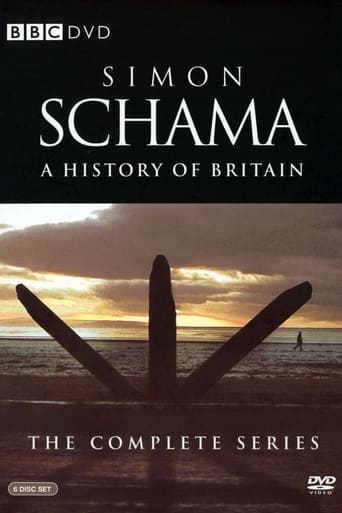
A History of Britain (2000)
Stretching from the Stone Age to the year 2000, Simon Schama's Complete History of Britain does not pretend to be a definitive chronicle of the turbulent events which buffeted and shaped the British Isles. What Schama does do, however, is tell the story in vivid and gripping narrative terms, free of the fustiness of traditional academe, personalising key historical events by examining the major characters at the centre of them. Not all historians would approve of the history depicted here as shaped principally by the actions of great men and women rather than by more abstract developments, but Schama's way of telling it is a good deal more enthralling as a result. Schama successfully gives lie to the idea that the history of Britain has been moderate and temperate, passing down the generations as stately as a galleon, taking on board sensible ideas but steering clear of sillier, revolutionary ones. Nonsense. Schama retells British history the way it was--as bloody, convulsive, precarious, hot-blooded and several times within an inch of haring off onto an entirely different course. Schama seems almost to delight in the goriness of history. Themes returned to repeatedly include the wars between the Scots and the Irish and the Catholic/Protestant conflicts--only the Irish question remains unresolved by the new millennium. As Britain becomes a constitutional monarchy, Schama talks less of Kings and Queens but of poets and idea-makers like Orwell. Still, with his pungent, direct manner and against an evocative visual and aural backdrop, Schama makes history seem as though it happened yesterday, the bloodstains not yet dry.
-

Episode 1 - Forces of Nature (1780 - 1832)
Release Date: 2002-05-28Britain never had the kind of revolution France experienced in 1789, but came close to it. This programme explains how 'the romantic generation' discovered the politics of sympathy with the common man. Nature was turned into a revolutionary idea by radicals and poets like Thomas Paine and William Wordsworth, and events across the channel following the fall of the Bastille initially seemed to point a way forward for Britain. But when the terrifying reality of the French Revolution set in, nature was recruited by the patriots.
-

Episode 2 - Victoria and Her Sisters (1830 - 1910)
Release Date: 2002-06-04Queen Victoria came to the throne at the tender age of eighteen, to rule over a country in the throes of a painful but supercharged industrial transformation. Chaos and revolution had been predicted by both socialists and traditionalists but in fact family life provided a bedrock of stability. This is how Britain's women, from the Queen to Chartist charladies and West Indian nurses managed the intense change and attempted to galvanize social reform for their Victorian sisters.
-

Episode 3 - The Empire of Good Intentions (1830 - 1925)
Release Date: 2002-06-11The British Empire promised peace, stability and prosperity but in Ireland and India it coincided with violence and famine. The programme examines the origins of agonies which continue to resonate today, and how political justice failed to feature in the administration of the time. As Victorian prime ministers, Gladstone and Disraeli promoted very different visions of Empire, but despite their lofty ideals, Schama observes how 'common humanity was sacrificed to the fetish of the market'.
-

Episode 4 - The Two Winstons (1910 - present)
Release Date: 2002-06-18Schama's last programme is a meditation on the place of the past in Britain's 20th-century history. Personified in the sharply different reactions of two of its greatest figures, Winston Churchill and George Orwell, the programme explores the fate of the country through two world wars, the slump and a nervous postwar peace. What was the impact of the crusades and the protests of the century, and did Winston Smith, hero of Orwell's 1984, foresee the contemporary political landscape?
